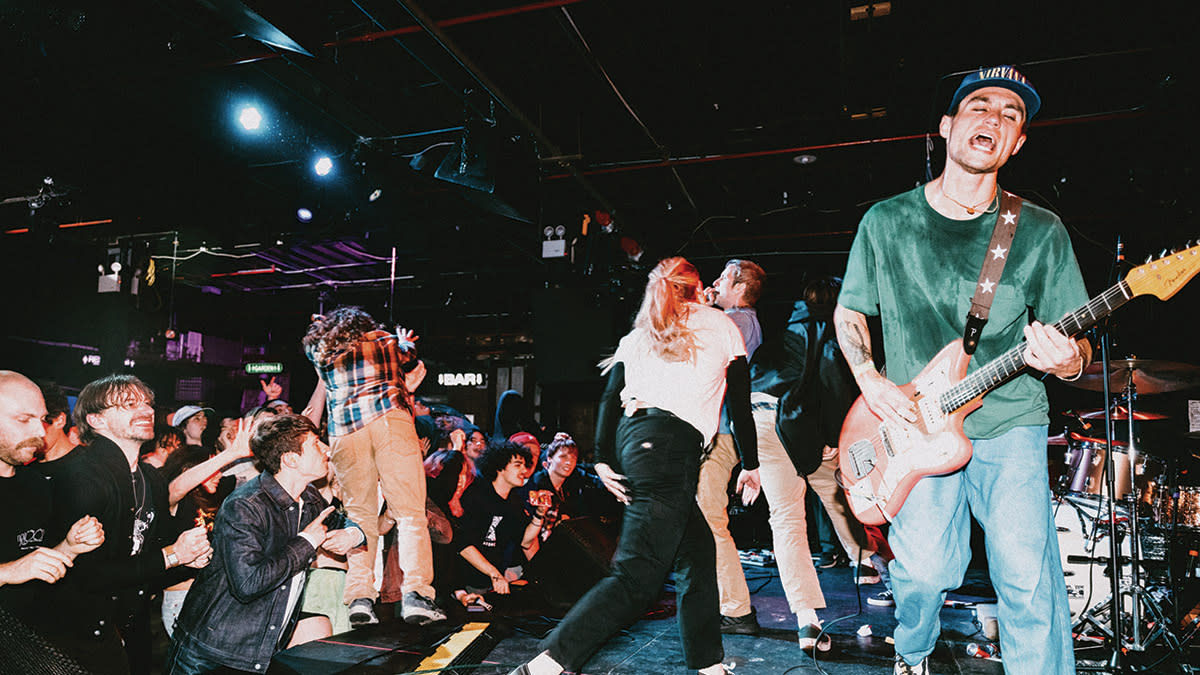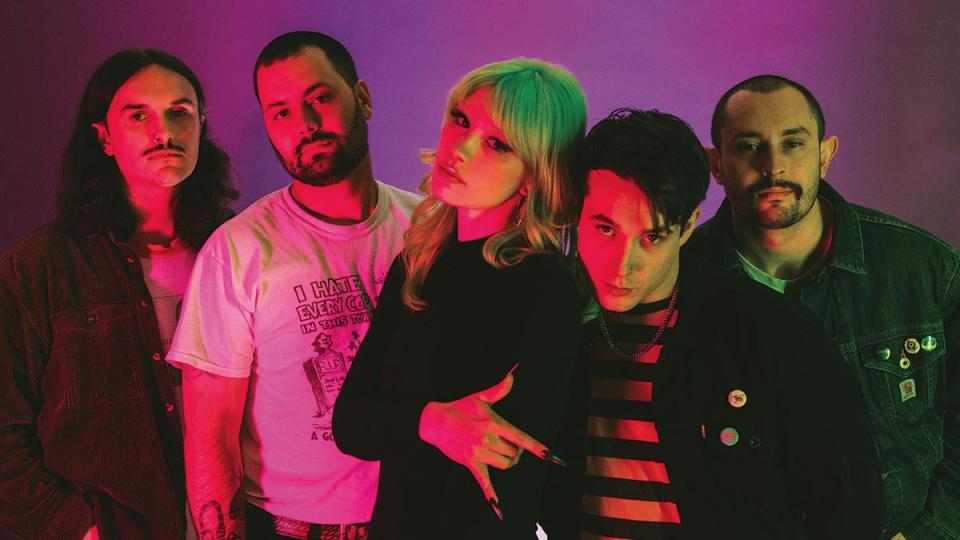“It’s all about what sounds cool… Not theoretically what you’re supposed to do”: How guitarists from Drug Church, Militarie Gun and Scowl are leading the melodic movement in hardcore punk

Every genre of music has its signature elements. Extreme metal has its blast beats, pop rock follows the familiar verse-chorus-verse-chorus-solo formula, and hardcore punk uses bludgeoning breakdowns to give momentary respite from its frenetic assault.
But every so often, the exceptions become the rule. When the Baltimore-based melodic hardcore band Turnstile released their breakthrough album Glow On to acclaim in 2021, reaching the top 30 on the Billboard Top 200 albums chart, the dam holding back a new group of outliers in the hardcore scene burst.
The ethos and the attitude haven’t changed – empowerment, independence and camaraderie are still central to hardcore music – but bands like Drug Church, Scowl, Fiddlehead and Militarie Gun are now bringing a much broader range of stylistic influences to the genre. Citing canonic alt-rock and pop-punk bands like Nirvana and Green Day, not to mention OG pop icons like the Beatles, the new breed of hardcore bands treats boundaries with as much respect as a barricade at a Knocked Loose show.
“[We] came from punk, and punk never really had rules,” says Malachi Greene of Scowl. “You look at the early Gilman scene [in Oakland, California] and you see bands like Op[eration] Ivy or Rancid or any of those bands; they’d be playing with Filth and Neurosis and Green Day. When you come from a melting pot of creativity, it’s gonna come out in some way, shape or form.”
Nick Cogan, who pulls double duty on guitar in Drug Church and Militarie Gun, is more intentional about pulling from a diverse range of influences while avoiding some of hardcore’s most inked-in trademarks.
“I have no interest in a breakdown for the sake of a breakdown,” Cogan says. “I just think someone needs to be able to take something away from the song, and I would love for [that to be] a catchy melody or chorus. I think a lot of bands are learning that.”
In Drug Church, Cogan instead uses those moments to wrestle more sounds from his Fender Jazzmaster, like the buzzing riffs on Hygiene, the band’s 2022 set and fourth album overall.
Since their debut self-titled EP in 2012, Cogan and co-guitarist Corey Galusha have inched away from the conventional sonic signifiers of hardcore punk, weaving melody into their interplay without compromising their crushing riffs. And according to their atypical songwriting process, the music has to stand on its own even before vocalist Patrick Kindlon gets hold of it.
“I’m writing most of the music for Drug Church, and the writing process is pretty non-traditional – I’m very rarely considering vocals at all,” Cogan says. “Even in the beginning, there would be four instrumentalists in a room trying to write entertaining instrumental music, trying to keep ourselves excited enough to play songs without vocals.”
The approach to songwriting and guitar couldn’t be more different in Militarie Gun, one the most adventurous bands to arise from the hardcore scene in years. “Ian [Shelton, vocalist] comes from more of a singer-songwriter perspective, where he might approach me with a riff that sounds really simple in my mind, but in his head he already has a melody figured out for vocals.”
Even in the beginning, there would be four instrumentalists in a room trying to write entertaining instrumental music, trying to keep ourselves excited enough to play songs without vocals
In place of chunky riffing, Militarie Gun’s repertoire explores open and unconventional chords, mining jangly alt-rock and post-punk guitar styles for texture.
On the mid-tempo, major-key Very High, Cogan punctuates Shelton’s vocal breaks with stabs of dissonant guitar licks. Alternately, Will Logic rides a Foo Fighters-esque guitar riff to a dreamy, shoegaze chorus.
Cogan – who is currently anchoring the bass while Will Acuña and Waylon Trim handle guitars live – recorded most of the guitars on their 2023 album, Life Under the Gun.
“When I joined the band [in 2021], there was a purposeful intention to not use big, heavy power chords, ’cause that’s what I was doing in Drug Church,” he says. “The effect of having two people [and] two sets of hands playing the same exact part with completely different tones and different styles, it has that natural chorus thing.”

While Page Hamilton of Helmet once lamented how hardcore purists derided him for singing more than screaming on their 1992 classic Meantime, today that move is seen as creative growth.
Scowl vocalist Kat Moss alternates in the same manner on their 2023 EP Psychic Dance Routine, bridging their scathing 2021 debut, How Flowers Grow, to whatever comes next, with one major difference: After hearing her sing on that album’s Seeds to Sow, fans actually wanted her to sing more.
“We did that as kind of a midpoint in the album, and a lot of people really liked it and were really adamant about [Moss] singing more stuff,” Greene says. “We felt the same way, and we’re influenced by a lot of bands that have melody and singing. The stuff we wrote for Psychic came out that way because of us wanting to lean a little more into the melody, juxtaposed to really aggressive stuff like Wired or Sold Out.”
Scowl came out of the same Santa Cruz, California, hardcore scene that produced bands like Good Riddance, Fury 66 and Bl’ast!, and their gnarled riffs often have more in common with Black Flag and Dead Kennedys than their contemporaries.
That’s due in part to how Greene and Bifolco both played bass before they switched to guitar – like Greg Ginn and Kurt Cobain (especially on Nirvana’s Bleach), menacing single-note runs are prominent on songs like Psychic Dance Routine.
Nowadays, with bands like Turnstile and even Militarie Gun, you can cite the Beatles as a reference and you’re not lame. There’s room for everyone
“It’s all about what sounds cool to me,” Greene says. “Not theoretically what you’re supposed to do – it’s more or less what I could sonically get out of the guitar, whether it’s single notes or harmonics or punching it. [Laughs] Whatever I have to do to get the sound out of it.”
Cogan sees his bands, and the current melodic movement in hardcore, as the center of the Venn diagram between unabashed pop and the punishing hardcore punk of their forebears.
“I just think times are a little bit different [now],” he says. “Maybe like 10, 15 years ago, you had to be a little bit more pigeonholed in regards to your interests and genres. Nowadays, with bands like Turnstile and even Militarie Gun, you can cite the Beatles as a reference and you’re not lame. There’s room for everyone.”
Drug Church's Hygiene is out now via Pure Noise.
Scowl's Psychic Dance Routine is out now via Flatspot.

